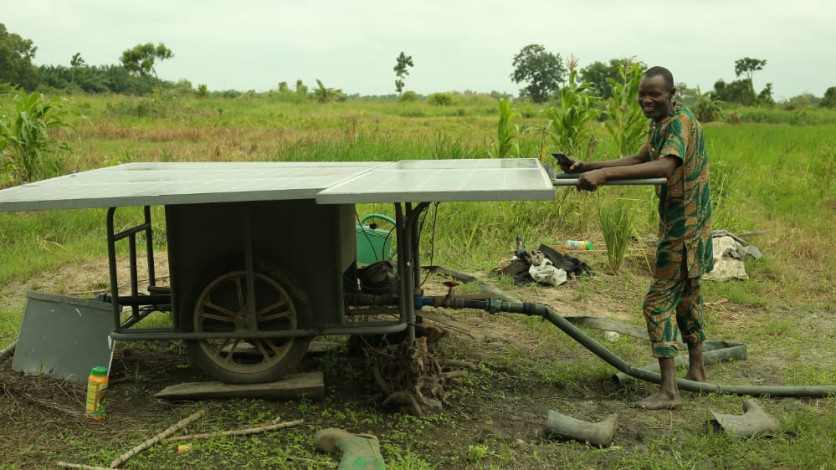
Rice farmer Joel Ogoumbeyi. Photo: Collected
Although Benin is blessed with abundant sunshine, vast inland surface water, and fertile soil, the country still imports more than half of the rice it needs to feed its population. To increase domestic production and improve the competitiveness of the rice sector, Energy 4 Impact has implemented a two-year program under the Water and Energy 4 Food initiative (WE4F), funded by GIZ, the German Agency for International Cooperation.
The country’s heavy reliance on imported food makes Benin particularly vulnerable to international turmoil and climate shocks. Overcoming shortfalls in domestic production has become even more pressing since the outbreak of the war in Ukraine, which led to squeezed supply and spiraling prices. The use of time- and labor-intensive methods of cultivation, lack of irrigation, and inefficiencies of rice processing mean that the domestic supply of rice is insufficient, of lower quality, and un-competitively priced compared to the imported varieties. Local rice producers have also had to deal with increasingly longer periods of drought which caused drastic drops in yields.
The program is centered on the Ouémé valley and the northern region of the Alibori, where Energy 4 Impact took a systematic approach to overcoming the barriers that hamper the sector, and to enabling a higher volume of better, more profitable products. It sought to demonstrate that building on the existing synergies and creating new collaborations between key stakeholders in the rice value chain (producers, processors, financial and technology providers, and off-takers) are effective ways to innovate the sector and pave the way for further expansion and scale-up. It also included introducing renewable energy and energy efficiency measures to optimize rice production and processing systems.
As the program drew to a close in July 2022, the results spoke for themselves. Access to solar irrigation accompanied by business support has helped participating farmers double their average yields from 2.5 to 5 tonnes per season. Energy 4 Impact’s advice on efficiency improvements to processing systems, allowed processors to cut their energy costs by 39% on average, improving the profitability of their businesses.
Rice farmer Joel Ogoumbeyi had been cultivating his one-hectare field in Adja-Ouèrè for nine years without adequate irrigation. He says, 'Relying on rainfall to water my crops became increasingly difficult when drier periods became more prolonged due to climate change. If it hadn’t rained for a while, I sometimes had to borrow a diesel-powered pump from my neighbor and tap into the river near my field. But the pump needed frequent refueling during periods of intensive use, so trips to the local petrol station were time-consuming. Volatility in fuel prices also often left me strapped for cash and unable to afford to run the pump as much as I needed.'
Joel’s former predicament is far from unusual. Less than 1% of cultivated land in Benin is equipped for irrigation, so most farmers struggle with getting enough water for their crops in the absence of rain. However, other shortfalls typically quash the productivity of rice producers in Benin too - patchy access to improved seeds and suitable inputs like fertilizers, inadequate knowledge of modern agronomic techniques, and the limited capacity of local farmers' organizations to help their small producers aggregate produce and reach more profitable markets.
Joel first became aware of more suitable and cost-effective irrigation alternatives when Energy 4 Impact conducted an awareness-raising campaign on solar irrigation in his area in December 2020. He says:
Not only did the officers show us how steady and consistent watering via a solar-powered system could produce larger yields, but I also learned that other important factors such as using herbicides, organic fertilizers, and improved seeds, are all critical to producing high-quality rice.
Joel decided to enroll in the WE4F program and agreed to turn his paddy field into a demonstration site, fitted with a complementary solar-powered irrigation system to allow other local rice farmers to see the benefits for themselves.
Through the program, Joel also received training on agronomy, horticulture, sustainable production, and efficient post-harvest management – a set of skills that would help make his farming more effective and resilient in the long term. The improvement in Joel’s yields has already had a tangible impact on his farm and family. Joel says, “Almost tripling my yield led to a huge increase in my income, which allowed me to afford better food and clothing for my family as well as pay for my children’s school fees.”
Energy 4 Impact helped strengthen the ties between the local farmer's organization led by Joel and their regional network of private social economic enterprises, with a contract farming approach called ESOP (Entreprise de Services et Organisations de Producteurs). The Adja-Ouèrè ESOP not only offers credit for seeds, fertilizer, and herbicides, but it also serves as an “offtake” that offers good prices for the unprocessed paddy rice they need to turn into ready-to-sell white rice.
Joel is one of eight farmers who ‘lent’ their farms to become demonstration sites for solar irrigation and best agronomic practices for the duration of the pilot. These demo sites enabled 1,000 farmers to trial solar-powered irrigation technologies, and receive training on improving crop production, marketing their products, business development, and negotiating with equipment suppliers, financial institutions (FIs), and off-takers. This led to 400 local farmers expressing an interest in acquiring the technology and receiving further technical training on handling and troubleshooting the pumps.
Energy 4 Impact also brokered an agreement with loan provider Agri-Finance and equipment supplier BM Solutions to bring the solar pumps into reach for low-income farmers through pay-as-you-go plans. Some of the 400 local farmers are currently taking advantage of this, and hopefully, many more will benefit from this new financing option in the near future.
Find more.
Source:
Online/SZK
Comment Now